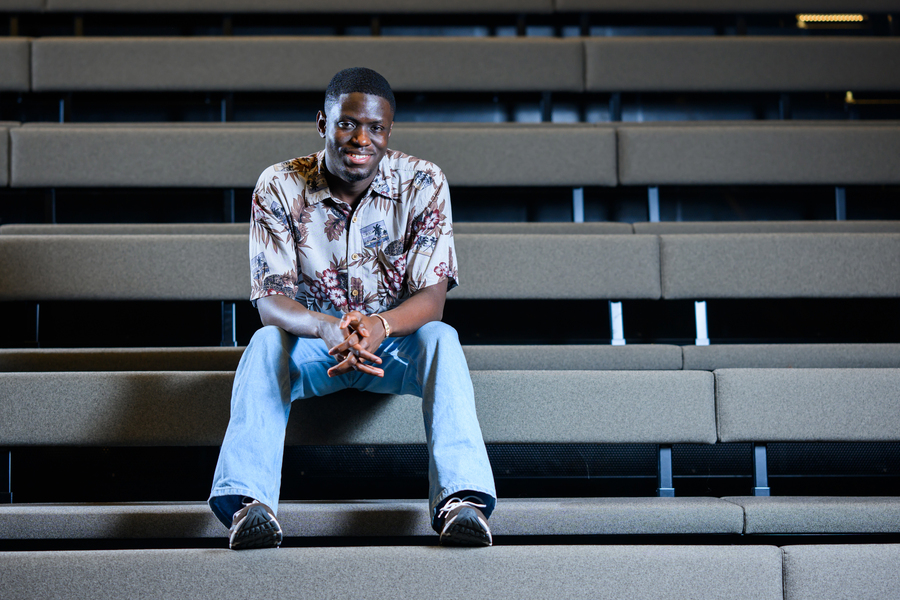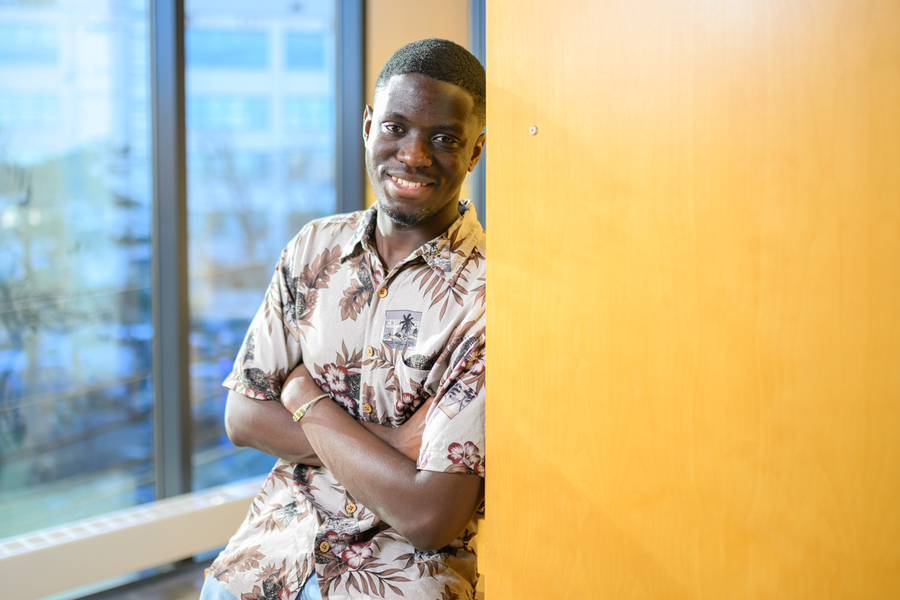Building technology that empowers city residents
 MIT senior Kwesi Afrifa believes technology has a unique power to accelerate urban development and empower citizens. With a major in urban planning and computer science, he seeks to create cultural hubs that are inviting to everyone. Photo credit: Gretchen Ertl
MIT senior Kwesi Afrifa believes technology has a unique power to accelerate urban development and empower citizens. With a major in urban planning and computer science, he seeks to create cultural hubs that are inviting to everyone. Photo credit: Gretchen Ertl Kwesi Afrifa came to MIT from his hometown of Accra, Ghana, in 2020 to pursue an interdisciplinary major in urban planning and computer science. Growing up amid the many moving parts of a large, densely populated city, he had often observed aspects of urban life that could be made more efficient. He decided to apply his interest in computing and coding to address these problems by creating software tools for city planners.
Now a senior, Afrifa works at the City Form Lab led by Andres Sevstuk, collaborating on an open-source, Python-based tool that allows researchers and policymakers to analyze pedestrians’ behaviors. The package, which launches next month, will make it more feasible for researchers and city planners to investigate how changes to a city’s structural characteristics impact walkability and the pedestrian experience.
During his first two years at MIT, Afrifa worked in the Civic Data Design Lab led by Associate Professor Sarah Williams, where he helped build sensing tools and created an online portal for people living in Kibera, Nairobi, to access the internet and participate in survey research.
After graduation, he will go on to work as a software engineer at a startup in New York. After several years, he hopes to start his own company, building urban data tools for integration into mapping and location-based software applications.
“I see it as my duty to make city systems more efficient, deepen the connection between residents and their communities, and make existing in them better for everyone, including groups which have often been marginalized,” he says.
“Cities are special places”
Afrifa believes that in urban settings, technology has a unique power to both accelerate development and empower citizens.
He witnessed such unifying power in high school, when he created the website ghanabills.com, which aggregated bills of parliament in Ghana, providing easy access to this information as well as a place for people to engage in discussion on the bills. He describes the effect of this technology as a “democratizing force.”
Afrifa also explored the connection between cities and community as an executive member of Code for Good, a program that connects MIT students interested in software with nonprofits throughout the Boston area. He served as a mentor for students and worked on finding nonprofits to match them up with.
Language and visibility
Sharing African languages and cultures is also important to Afrifa. In his first two years at MIT, he and other African students across the country started the Mandla app, which he describes as a Duolingo for African languages. It had gamified lessons, voice translations, and other interactive features for learning. “We wanted to solve the problem of language revitalization and bring African languages to the broader diaspora,” he says. At its peak a year ago, the app had 50,000 daily active users.
Although the Mandla App was discontinued due to lack of funding, Afrifa has found other ways to promote African culture at MIT. He is currently collaborating with architecture graduate students TJ Bayowa and Courage Kpodo on a “A Tale of Two Coasts,” an upcoming short film and multimedia installation that delves into the intricate connections between perceptions of African art and identity spanning two coasts of the Atlantic Ocean. This ongoing collaboration, which Afrifa says is still taking shape, is something he hopes to expand beyond MIT.

Discovering arts
As a child, Afrifa enjoyed writing poetry. Growing up with parents who loved literature, Afrifa was encouraged to become involved with the theater and art scene of Accra. He didn’t expect to continue this interest at MIT, but then he discovered the Black Theater Guild (BTG).
The theater group had been active at MIT from the 1990s to around 2005. It was revived by Afrifa in his sophomore year when Professor Jay Scheib, head of Music and Theater Arts at MIT, encouraged him to write, direct, and produce more of his work after his final project for 21M.710 (Script Analysis), a dramaturgy class taught by Scheib.
Since then, the BTG has held two productions in the past two years: “Nkrumah’s Last Day,” in spring 2022, and “Shooting the Sheriff,” in spring 2023, both of which were written and directed by Afrifa. “It’s been very rewarding to conceptualize ideas, write stories and have this amazing community of people come together and produce it,” he says.
When asked if he will continue to pursue theater post-grad, Afrifa says: “That’s 100 percent the goal.”
Media Inquiries
Journalists seeking information about EECS, or interviews with EECS faculty members, should email eecs-communications@mit.edu.
Please note: The EECS Communications Office only handles media inquiries related to MIT’s Department of Electrical Engineering & Computer Science. Please visit other school, department, laboratory, or center websites to locate their dedicated media-relations teams.